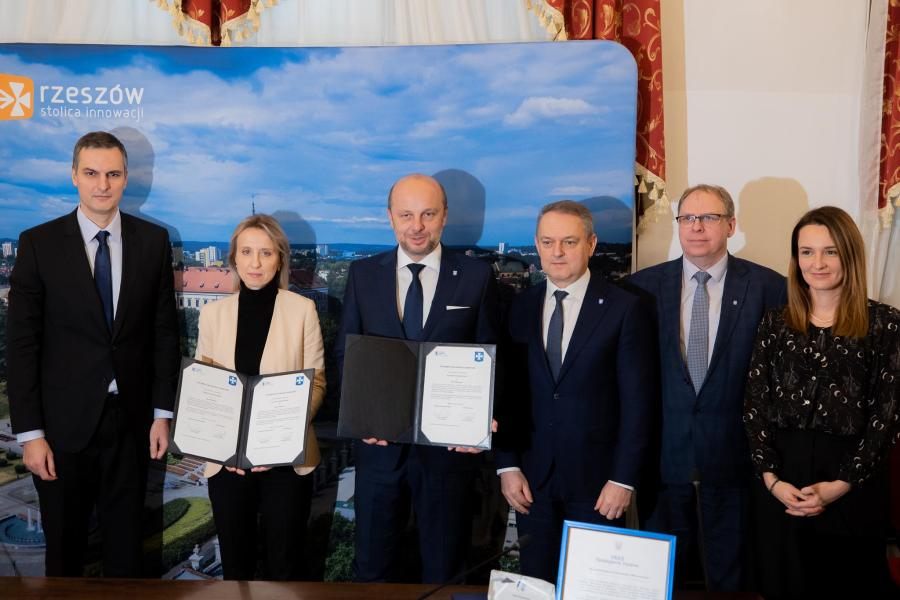
- The EIB has signed an agreement with the City of Rzeszów to provide PLN 350 million in financing, which will be used to implement investments supporting the sustainable development of urban infrastructure.
- The investments will include expansion of the educational base, development of urban roads and cycle paths, revitalisation of green and recreational areas, and expansion of municipal services.
The European Investment Bank (EIB) and the City of Rzeszów have been working together since 2011, and thanks to this long-term cooperation the city can dynamically modernise and implement its sustainable development strategy. The PLN 350 million in financing will support the expansion of Rzeszów’s infrastructure, allowing it to meet the city’s growing needs. The investments will be compatible with measures that benefit climate protection as well as those covered by the European Union's cohesion policy, as Rzeszów lies within a cohesion region.
Demographic trends in the city have been positive for over 20 years. Between 2002 and 2021, the city’s population grew by 24%. Currently, as a result of the war in Ukraine and the influx of refugees, it has increased by another 50%, reaching 300 000 inhabitants. This significant rise in the population has created an urgent need to expand the city’s infrastructure and services. The agreement with the EIB will enable Rzeszów to respond dynamically and adapt its infrastructure base to these new challenges.
EIB Vice-President Teresa Czerwińska said: “The EIB is proud to strengthen its cooperation with Rzeszów — we believe that it will result in the further dynamic development of the city, even in such difficult times as we are experiencing today. The investments that the city is planning will certainly contribute to the green development of the urban infrastructure, make the lives of residents more comfortable, and accelerate the acclimatisation of newcomers from Ukraine. Rzeszów and the Podkarpackie Province are a cohesion region. Supporting cohesion policy is a priority objective for the EIB and we will do our best to implement it.”
“The financial support offered by the European Investment Bank is extremely important for us. It will allow us to finance many measures, both municipal ones and those which will in future enable us to integrate and provide help to people fleeing the war in Ukraine,” said the Mayor of Rzeszów Konrad Fijołek.
Rzeszów is the largest city in the Podkarpackie Province, and its many years of dynamic development are linked to the city’s strategic location and its attractive offer for businesses and the academic community. The city has made it possible for higher education institutions to develop and enjoys great popularity among Polish and foreign students. Business support has focused on sectors of strategic importance: aerospace and IT.
Due to its location, Rzeszów and its environs are an important hub for trade between Ukraine and Poland, which has a positive impact on the city’s economic development. An additional asset, especially important in this difficult time of war in Ukraine, is the largest airport in the region, with a runway long enough to accommodate even the largest military and civilian aircraft.
Promoting cohesion has been a priority for the European Investment Bank since its creation in 1958. In the European Union's most recent long-term budget, covering 2014 to 2020, the EIB Group supported investments worth around €630 billion in less prosperous regions (so-called cohesion regions), which is equivalent to around 16% of EU GDP. In 2021, Poland was the largest beneficiary of funding for cohesion regions by the EIB Group. This funding amounted to €4.5 billion, 35% of which supported sustainable urban and regional development, and 23% sustainable energy transition. Another 23% went on the development of innovation, digitisation and human capital. Small and medium-sized enterprises received 19% of the funding earmarked for cohesion regions.
Background information:
The European Investment Bank (EIB) finances projects in four priority areas — infrastructure, innovation, climate and environment, and small and medium-sized enterprises (SMEs). As of 2019, the EIB, as the EU climate bank, has pledged to allocate at least 50% of its financing (by 2025) to investment projects that contribute to the fight against climate change.
City of Rzeszów
Rzeszów is the largest city in south-eastern Poland and the capital of the Podkarpackie Province, which forms the eastern border of the European Union; it is also the centre of the Rzeszów Metropolitan Area. It is the seat of local and provincial authorities as well as judicial and government institutions, and is the economic, academic, cultural and recreational hub of south-eastern Poland. Rzeszów serves as an important centre of the aviation, IT, chemical, commercial, construction and service industries. It is a rapidly developing city of young and enterprising people. More than 28 000 companies operate in Rzeszów, supported by over 800 business environment institutions. The city’s main industries include aviation, IT, construction and chemicals. The pharmaceutical, food and automotive industries, as well as the modern business services and renewable energy sectors, are also developing very well.
Following the outbreak of the war in Ukraine, Rzeszów received 100 000 Ukrainian citizens at the peak of the refugee wave. Currently, there are around 30 000 refugees from Ukraine living in the city.

